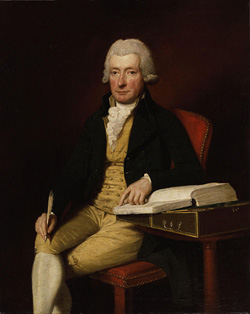Damned Great
Why are William Cowper's poems so witty? Because he was convinced he was going to hell.
The Christian poet and hymnodist William Cowper (1731-1800) at times in his life believed that he was already and irrevocably damned: damned to hell, and facing the additional doom of carrying that knowledge while still walking around in earthly daylight.
In keeping with our contemporary notion of professional comics as tormented, gloomy souls, Cowper had a distinctive and weird comic gift. One of his poems has the engaging title "To the Immortal Memory of the Halibut, on Which I Dined This Day." The charming "Epitaph on a Hare" presents what I consider a shrewd version of the role even a surly pet can play in a person's life: "I kept him for his humor's sake,/ For he would oft beguile/ My heart of thoughts that made it ache,/ And force me to a smile."
"Lines Written During a Period of Insanity," possibly Cowper's best-known poem, delivers tremendous force, rooted, for me, in the self-contradiction of its energetic hopelessness: If the narrator's predicament is so absolute and unrelievable, how can he describe it with such explosive intellectual strength? Some readers may find something like a wit stripped of laughter (or is it just bitter laughter?) in the poem's final contrast with Abiram, who in the biblical story of punishment was swallowed up into the pit while still alive. The "fleshly tomb" of being alive in complete despair is a worse fate than Abiram's, the poem declares in its bizarre but affecting climax.
We sometimes criticize someone for "taking himself too seriously." Cowper's work presents a sensibility that challenges that notion—or takes it to an extreme, to a point where opposites meet and a comic or ironic detachment accompanies total dread. As a poem about mortality, "Epitaph on a Hare" manages to combine light-heartedness and heart-breaking sobriety in a way I find unforgettable.
"Lines Written During a Period of Insanity"
Hatred and vengeance, my eternal portion,
Scarce can endure delay of execution,
Wait, with impatient readiness, to seize my
...................................Soul in a moment.
Damned below Judas: more abhorred than he was,
Who for a few pence sold his holy Master.
Twice betrayed Jesus me, the last delinquent,
...................................Deems the profanest.
Man disavows, and Deity disowns me:
Hell might afford my miseries a shelter;
Therefore hell keeps her ever hungry mouths all
...................................Bolted against me.
Hard lot! encompassed with a thousand dangers;
Weary, faint, trembling with a thousand terrors;
I'm called, if vanquished, to receive a sentence
...................................Worse than Abiram's.
Him the vindictive rod of angry justice
Sent quick and howling to the center headlong;
I, fed with judgment, in a fleshly tomb, am
...................................Buried above ground.
….….…................….….…—William Cowper
Click the arrow on the audio player below to hear Robert Pinsky read William Cowper's "Lines Written During a Period of Insanity." You can also download the recording or subscribe to Slate's Poetry Podcast on iTunes.
"Epitaph on a Hare"
Here lies, whom hound did ne'er pursue,
...Nor swifter greyhound follow,
Whose foot ne'er tainted morning dew,
...Nor ear heard huntsman's hallo',
Old Tiney, surliest of his kind,
...Who, nursed with tender care,
And to domestic bounds confined,
...Was still a wild jack-hare.
Though duly from my hand he took
...His pittance every night,
He did it with a jealous look,
...And, when he could, would bite.
His diet was of wheaten bread,
...And milk, and oats, and straw,
Thistles, or lettuces instead,
...With sand to scour his maw.
On twigs of hawthorn he regaled,
...On pippins' russet peel;
And when his juicy salads failed,
...Sliced carrot pleased him well.
Turkey carpet was his lawn,
...Whereon he loved to bound,
To skip and gambol like a fawn,
...And swing his rump around.
His frisking was at evening hours,
...For then he lost his fear;
But most before approaching showers,
...Or when a storm drew near.
Eight years and five round-rolling moons
...He thus saw steal away,
Dozing out all his idle noons,
...And every night at play,
I kept him for his humor's sake,
...For he would oft beguile,
My heart of thoughts that made it ache,
...And force me to a smile.
But now, beneath this walnut-shade
...He finds his long, last home,
And waits in snug concealment laid,
...Till gentler Puss shall come,
He, still more aged, feels the shocks
...From which no care can save,
And, partner once of Tiney's box,
...Must soon partake his grave.
….….…................….….…—William Cowper
Click the arrow on the audio player below to hear Robert Pinsky read William Cowper's "Epitaph on a Hare." You can also download the recording or subscribe to Slate's Poetry Podcast on iTunes.
Slate Poetry Editor Robert Pinsky will be joining in discussion of these poems by William Cowper this week. Post your questions and comments on the work, and he'll respond and participate. You can also browse "Fray" discussions of previous classic poems. For Slate's poetry submission guidelines, click here. Click here to visit Robert Pinsky's Favorite Poem Project site.
